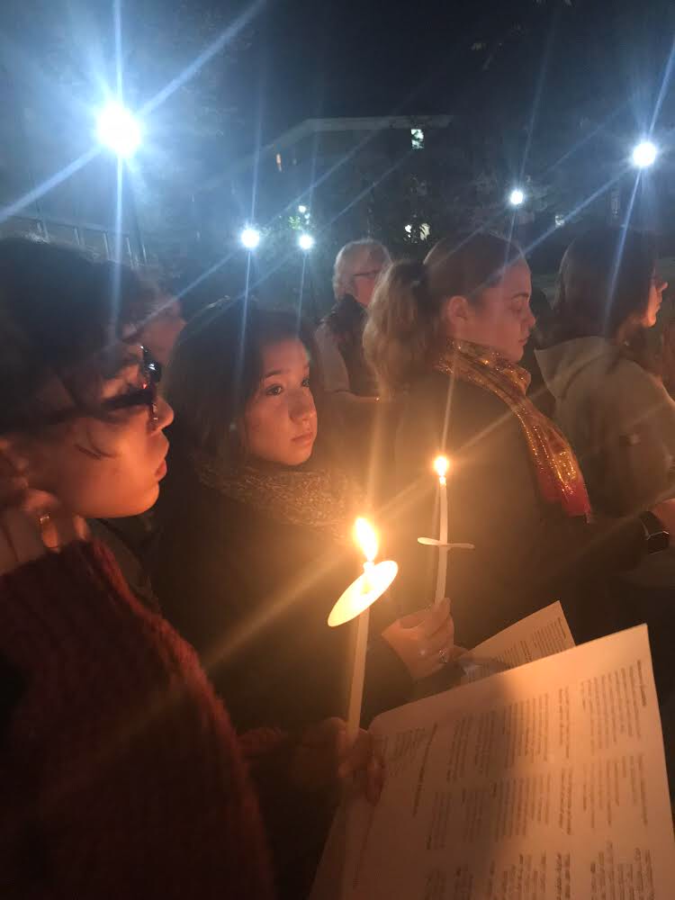Students of Jewish Faith Respond to the Deadliest Anti-Semitic Attack in U.S. History
Members of Pace’s Hillel club at a vigil for the victims of the Pittsburgh attack at Manhattanville College on Oct. 29.
In the aftermath of the anti-Semitic attack a week ago, the Jewish communities at Pace and nationally are looking toward processing their feelings to positively influence the future.
On Oct. 27, a man opened fired at the Tree of Life synagogue in Pittsburgh, killing 11 people attending the Saturday Shabbat. The tragedy was the deadliest attack on Jewish people in U.S. history.
Even though this attack directly damaged the Tree of Life synagogue and its congregants, the hatefulness of the attack can be felt throughout the entire Jewish community across the country. Rather than being many individual communities, the Jewish community is interconnected, so an attack like the one over the weekend is felt by everyone.
Pace President Marvin Krislov released a statement on Oct. 29 in response to the attack.
“In this frightening time, I am thankful for the safe and supportive community we have at Pace University,” wrote Krislov. “Across Pace, we are all here for one another. Let us remember last week’s victims, and let us continue to support each other, value each other, and continue working to understand one another better.”
Pace’s Hillel organization provides an opportunity for Jewish students—and students interested in Judaism—to come together for events and discussions. On Oct. 31, Hillel hosted a meeting to discuss how students were feeling in response to the Pittsburgh attack. Also in attendance were Rachel Simon, Associate Director of Multicultural Affairs and Diversity Programs; Lisa Bardill Moscaritolo, Dean for Students; Lauren Saler, Associate Director of the Counseling Center; and Rachel Klein, Executive Director of the Hillels of Westchester.
“I don’t often experience blatant anti-Semitism,” said Sydney Krantz, a junior digital cinema and filmmaking major who is president of Pace’s Hillel organization. “This attack surprised me. I forget from time to time that we are a minority group. This is a reminder that anti-Semitism is still out there.”
Jewish students at Pace have been experiencing a range of emotions including anger, sadness, outrage, fear, and disillusionment.
The Anti-Defamation League reported that the number of anti-Semitic incidents grew nearly 60% from 2016 to 2017.
“I’m used to people not understanding what it means to be Jewish,” said junior education major Sophia Sank. “Even though I’m proud to be Jewish, I’m going to be more cautious now.”
After the attack last Saturday, President Donald Trump held a press conference on the matter where he was asked if the incident would increase measures of gun control.
“If they had protection inside, the results would have been far better. If they had some kind of protection within the temple it could have been a much better situation. They didn’t,” said President Trump. “This is a case where if they had an armed guard inside they may have been able to stop him immediately, maybe there would have been nobody killed, except for him maybe.”
This sentiment regarding security at synagogues touched a nerve in the Jewish community. Many of Pace’s Hillel members expressed their disappointment and anger at the president’s assertion that the Tree of Life synagogue could have protected itself.
“The president’s statements continue the history of victim blaming Jewish people for the attacks against them,” Krantz said.
Most students were also no comfortable having armed security in their synagogues.
“When I go, I go to focus on myself and my relationship with God,” said sophomore criminal justice major Daniella Harris. “I want to put my worries aside when I’m in temple.”
“It’s irritating to have to get security at a place that’s supposed to be a safe haven,” added Sank.
Along with disagreement over President Trump’s opinion on security at places of worship, Jewish students also expressed their opinions that the president is at least partially to blame because of the rhetoric he uses in speeches, interviews, rallies, and tweets.
“I think it’s ironic that this happened in the same week that the president called himself a nationalist, which is what the ‘n’ stands for in Nazi,” Kenny Szeto, a senior education and history major, said.
Throughout the Hillel meeting, multiple students expressed how this attack could have happened anywhere to any Jewish synagogue.
“My sister is a rabbi, and I’m scared for her since this could happen at her synagogue,” said Sank.
“A brisk was scheduled at that synagogue on Saturday. Any event—a wedding, bar mitzvah, bat mitzvah, anything—could have been cut short,” said Szeto.
The Hillel organization has been discussing how they can help in response to Pittsburgh. They are one of the many organizations holding the Smashing Pumpkins Smashing Stereotypes event on Miller Lawn this Monday. Hillel also plans to host a Refugee Shabbat in the future to raise money for HIAS, an organization that provides assistance and aid to refugees.
“I think it’s amazing that we are focused on helping refugees, people outside of our community, as opposed to closing ourselves off from the world,” said Krantz.
Your donation supports independent, student-run journalism at Pace University. Support the Pace Chronicle to help cover publishing costs.

